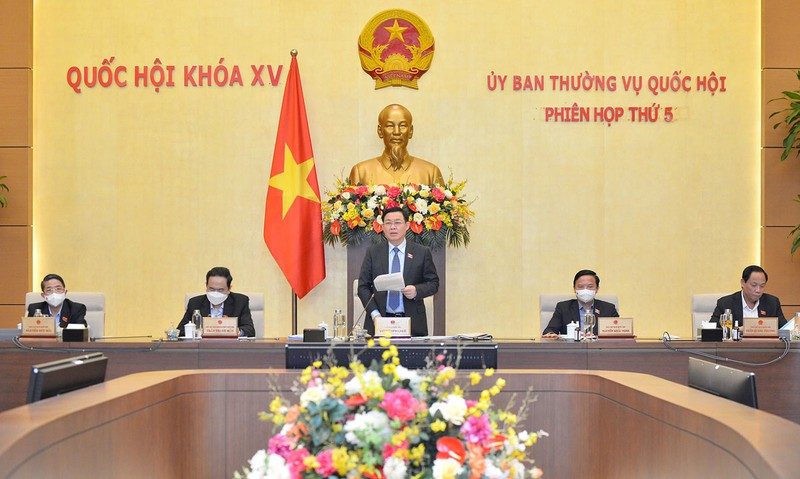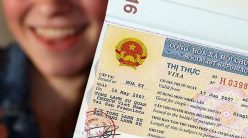The promulgation of the resolution aims to comply with Vietnam’s commitment schedule in the CPTPP, ensuring the uniform application of the provisions of the Penal Code in handling criminal acts…
On November 23, the National Assembly Standing Committee (NA) approved a resolution explaining Clause 1, Article 289 of the Penal Code 2015. The resolution takes effect from January 14, 2022.
What is illegal intrusion, data theft?
Accordingly, the Standing Committee of the National Assembly decided: Acts of intentionally bypassing warnings, access codes, firewalls, using other people’s administrative rights or by other methods to illegally infiltrate computer networks, telecommunications networks Information or electronic means of other people stealing data specified in Clause 1, Article 289 of the Penal Code 2015 is understood as including intentionally bypassing warnings, access codes, firewalls, using administrative rights. of another person or by other means illegally infiltrating another person’s computer network, telecommunications network or electronic means, appropriating data containing business secrets, including listening, reading, taking notes, taking pictures , audio recording, video recording of data containing trade secrets.
Previously, on October 7, 2021, the Government submitted a draft resolution explaining a number of articles of the 2015 Penal Code. The Government’s report shows that on November 12, 2018, the National Assembly issued a Resolution Decision 72/2018/QH14 on ratification of the Comprehensive and Progressive Agreement for Trans-Pacific Partnership and related documents (CPTPP Agreement). This Agreement officially took effect for Vietnam from January 14, 2019.

The Government said that for the request to criminalize the act of “violation of business secrets” as required in Clause 2, Article 18.78 “CPTPP Agreement”, there are still different views among ministries and sectors on how to understand and apply the regulations. in some articles of the Penal Code when handling criminal liability.
In this report, the Government chooses the act of “stealing data” specified in Clause 1, Article 289 and the act of “illegal appropriation of documents of agencies or organizations” specified in Clause 1, Article 342 of the Penal Code. 2015 to explain.
At the same time, in order to narrow the scope of handling violations of business secrets while still meeting the requirements of the CPTPP Agreement, when explaining Clause 1, Article 289 and Clause 1, Article 342, the Government explains together with the purpose of the person committing the act of violating the trade secret. It is “in order to gain commercial advantage, gain unjust profit or harm the owner”.
After an examination session of the Judiciary Committee, on November 19, 2021, the Government continued to make an additional report, only proposing to explain Clause 1, Article 289 of the Penal Code in the direction of including the act of appropriating data that is harmful to the environment. containing trade secrets, including listening, reading, taking notes, taking pictures, recording audio, recording data containing trade secrets.
Ensuring the legitimate interests of the offenders
The Government’s report stated: The promulgation of a resolution explaining a number of articles of the Penal Code in 2015 aims to ensure the effective and correct implementation of the commitments of the Government of Vietnam in the CPTPP Agreement.
At the same time, ensure the suitability and consistency in the legal system; ensure clarity and transparency to uniformly apply the provisions of the Penal Code in handling criminal acts, as well as ens.
Do not add “purpose” to the explanation content
Expressing its views in the verification report, the Judiciary Committee unanimously chose Clause 1, Article 289 to explain, in order to meet the requirements of the CPTTP Agreement.
Also according to the verification authority, paragraph 3 of Article 18.78 of the agreement recommends that member states: “For one of the three acts mentioned above, it can be applied in one or more cases, including: (a) The acts it is for the purpose of achieving commercial advantage or financial gain; (b) such acts relate to products or services in national or international trade; (c) such conduct is intended to cause harm to the owner of such trade secret; (d) such acts are governed by, or the profit of, or in connection with a foreign economic organization or (e) such acts are detrimental to economic interests, international relations or national security or defense of a party”.
“This is a recommendation of the agreement and is not a mandatory requirement for member states,” the Judiciary Committee commented and agreed not to add “purpose” to the explanation. The examining agency considers that this is inconsistent with the provisions of Point c, Clause 2, Article 158 of the Law on Promulgation of Legal Documents on “The interpretation of the law must ensure the principle that it cannot be modified, supplemented or placed new regulations”.
“Adding the criminal purpose will narrow the scope of criminal handling, incompatible with the basic composition of the crime of intrusion on another person’s computer network, telecommunications network or electronic means” – inspection report stated.
Moreover, this also creates inconsistency and inequality in the criminal policy for acts in the same law, causing difficulties in the application process.
“If appropriating data containing business secrets must prove the criminal purpose to be criminally handled, if appropriating other data does not need to prove the criminal purpose,” the verification agency cited.









